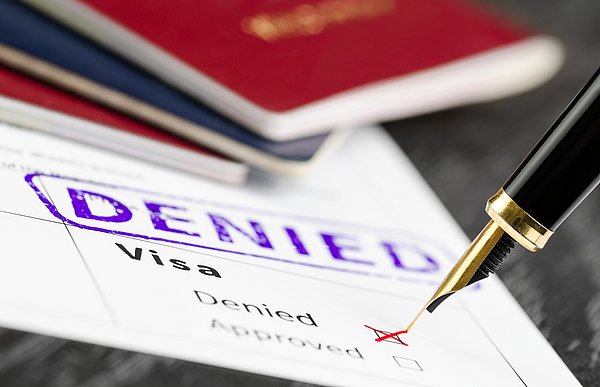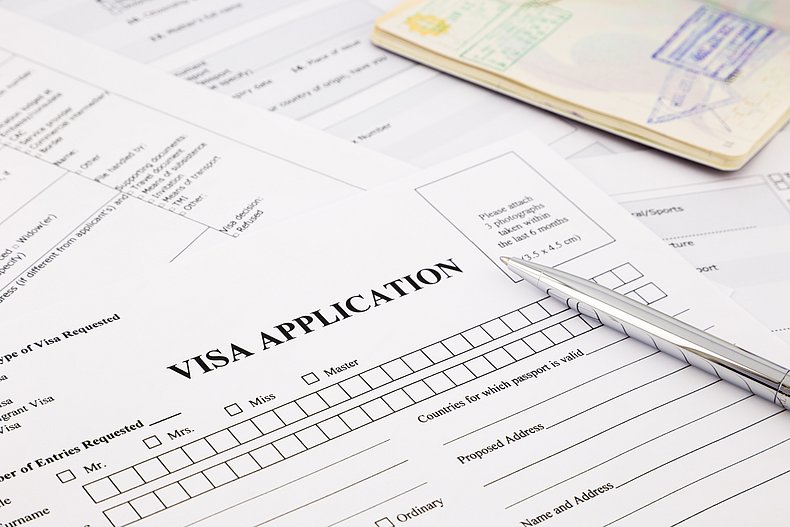To be able to enter Germany or rather study or absolve a language course there, citizens of most countries need a visa. The bureaucratic application process can be quite confusing and unclear. In addition, the requirements can vary from country to country and from applicant to applicant. In order to have a first overview of who has to take care of or apply for what and where, we tried to answer the most important questions concerning visas – especially for students and language pupils but also for visits from relatives and friends – for you.
How Do You Apply for a Visa to Stay in Germany?
Who needs a visa?
In order to be able to stay in Germany for more than three months basically everybody not living or doing ones major studies in a member state of the European Union, Iceland, Liechtenstein, Norway or Switzerland needs a visa, respectively a residence title for specific purposes. Citizens of Australia, Canada, Israel, Japan, the Republic of Korea (South Korea), New Zealand and the USA can apply for their residence title for specific purposes after they entered the country. This is also true for people from Andorra, Brazil, El Salvador, Honduras, Monaco and San Marino as long as they do not plan to work in Germany. Still, you should keep in mind the long processing time of visa applies. However, citizens of other nations definitely should take care of their visa way ahead their planned stay in Germany!
Which are the requirements to get a visa?
For a stay of more than 90 days or a residence title allowing working in Germany, you need a so-called national or D-visa. Therefore, you surely need to have a passport that does not expire before three months after the planned end of your stay. Students’ visas are also kinds of D-visas. You usually need an approval document of the German university you’re going to study at to get one. Sometimes, it is also possible to get a study-applicant-visa when it’s not clear at which university you’re going to study at the moment of your application. Then you have to hand in the certificate of matriculation at the German Aliens Department as soon as you get it, as that’s the basic requirement for a visa for study purposes. Additionally, you have to proof that you’re able to finance a stay in Germany for at least one year on your own. The safest way to do that is to have a so-called ‘blocked account’. These kinds of accounts can be opened at almost every German bank. After opening it, you have to transfer at least 8,640 € to it. The account is special because one is not able to access it before entering the country. In addition, you can only get 720 € per month. An officially approved stipend also counts as a proof. In exceptional cases, a statement about the assumption of costs by ones parents or the proof of one’s own financial situation can be accepted as well. However, because the public authorities often insist upon a blocked account, it is definitely the safest way to open one for all those who are not lucky enough to have a stipend. Furthermore, you need to be health insured in Germany. You will need a certificate of your insurance to matriculate yourself at the university and for your residence authorization. Besides, it is very important to be secured during your stay to be able to feel safe. Look up our different kinds of insurances for international students.
Where and how can you apply for a visa?
Basically German embassies and consulate generals, thus the diplomatic representations of the state of Germany abroad at the home country of the applicant, are responsible for issuing visas. You can look up where the agency responsible for your case is located on the website of the Federal Foreign Office. Moreover, you have to hand in your apply with all necessary documents personally. As the requirements can vary a little from country to country, you should definitely inform yourself beforehand on the website of the responsible institution about which documents you are obliged to add to your apply. The formulas have to be handed in in the particular language version of the respective institution and can be downloaded on its website easily. Citizens of the above-mentioned exceptional states can also apply for their residence title for specific purposes at the German Aliens Department of their (future) residence in Germany. This agency is also the place to go for any further questions or issues concerning your right of residence when you’re already in Germany.
How much does a visa cost and how long is the processing time?
Whilst visas for short stays (Schengen-visa) are often finished within two to ten working days, visas for long-term stays can have a processing time of multiple, mostly up to three months. During the main seasons of entry, it is furthermore possible that you have to wait until you get an appointment to apply. Therefore, it is especially important to deal with this subject early enough! The national, thus long-term visa then costs 75 €. Stipendiaries and their spouses or partners as well as their underage children as far as they’re also part of the furtherance can be freed of this charges. Short-term Schengen-visas usually cost 60€, for six to twelve year olds 35€ and are free for children younger than six. More detailed information about the possibilities of being freed of the visa charges can be found at the Federal Foreign Office.
Is there anything you can do when your application has been refused?

Basically the public agencies have to tell you why they refused your application. Afterwards one has the possibility to take legal action against the disclamation and proof that the reasons for it are unimportant or not corresponded to the truth. Then, the institutions have to prove the case again. However, there is no guaranty to get a visa. Still, it is quite unlikely to be refused when handing in all necessary papers and the approval document of the university as well as a proof for an appropriate blocked account early enough.
Is the visa valid for the whole European Union?
The long-term D-visa is firstly valid for a stay in Germany whilst the Schengen-visa is valid for the whole Schengen-area. However, it is still possible to travel through Europe with a national visa and a valid passport. Indeed, there is a time limit to that: With a D-visa, you’re allowed to move freely in the Schengen-area for three within six months. Caution: Be aware that the Schengen-area is neither the same as the continent of Europe nor as the European Union! Whilst the non-EU-member-states Switzerland, Iceland, Liechtenstein and Norway are part of it, Great Britain, the republic of Ireland, Croatia, Rumania, Bulgaria and Cyprus are not part of the Schengen-area although they are members of the EU. Therefore, for these countries there are individual rulings concerning the entry mostly requiring an application for a touristic visa.
Which are the requirements for a short-term visa?
After finally being finished with all the visa-stress and arriving in Germany safely, there might be a point of time when friends or relatives want to come over for a visit. Of course, being surrounded by your loved-ones and showing them your life here is especially nice. Nevertheless, most of the time that means to be obliged to care about visas again. Even though short-term visas are a little bit cheaper and especially faster to request, the requirements are quite similar to the long-term ones. Therefore, one has to explain the purpose of the journey in a plausible way, proof that one is able to finance the travel and stay oneself and willing to leave the Schengen-are after the visa ends as well as having an adequate travel health insurance. Thereby, the financial proof can also be made through another person. However, the citizens of some countries do not require a visa for a short-term stay. Which countries are freed of the need for a Schengen-visa can be looked up at the Federal Foreign Office.
Summary of the most important aspects
The bureaucratic effort and stress about delays is sadly almost inevitable when applying for a visa. Don’t let that get you down! It is most important to care about the application at an early stage so that you have enough time to be relaxed despite the long processing times or extra requests. Inform yourself precisely which requirements are mandatory for your home country and be careful to apply for the right visa as it is not possible to switch a touristic visa into a visa for study purposes in retrospect. The best way to do it is probably to plan your entry to Germany with enough free time so you have enough time for the matriculation and take care of your obligations regarding the state authorities, for instance going to the German Aliens Department. If you’re additionally keep an eye on your passports’ expiring date, open a blocked account and procure a health insurance, you’ll be able to enjoy your stay in Germany untroubled by annoying bureaucracy to the fullest!
To be sure to not really not forget anything, you can also download your personal checklist as a pdf-document:



